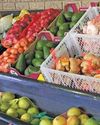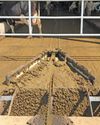
"The Tyhume River, flowing from the forested Amathole Mountains in South Africa’s Eastern Cape, gives its name to a valley of 20 villages on communal land. Much of the land is being used for livestock, as crop production has declined over the years. This land is under the custodianship of traditional leaders.
The valley is typical of South Africa’s communal land: affected by soil erosion, bush encroachment and water scarcity.
About a third (more than 17 million) of South Africans live on communal land, which makes up about 13% of all land in the country. The 2017 Communal Land Tenure Bill defines communal land as “owned, occupied or used by members of a community subject to shared rules or norms and customs”. It can also be owned by the state.
This land can benefit rural communities by providing ecosystem goods and services, such as shelter, water, fuel/wood, food and cultural amenities. But natural processes and human activity can transform the land.
Unmonitored and poorly managed land changes can trigger soil erosion, overgrazing, loss of biodiversity and water scarcity. In South Africa, communal land is considered to be more degraded than privately owned land. This can negatively affect the livelihoods of people who derive ecosystem services from it.
Common indicators and causes of land degradation are generally understood. But less is known about how people living in communal lands interpret land changes and their impact. It’s unclear what they perceive as land degradation or which kinds of land changes matter most to them. This helps explain the lack of sound policies and practical strategies to rehabilitate land.
This story is from the {{IssueName}} edition of {{MagazineName}}.
Start your 7-day Magzter GOLD free trial to access thousands of curated premium stories, and 9,000+ magazines and newspapers.
Already a subscriber ? Sign In
This story is from the {{IssueName}} edition of {{MagazineName}}.
Start your 7-day Magzter GOLD free trial to access thousands of curated premium stories, and 9,000+ magazines and newspapers.
Already a subscriber? Sign In

Agripreneur wins top award for butternut coffee
Bloemfontein-based agripreneur Chantelle de Bruyn has achieved global recognition.

Final fresh produce inquiry pins low level of transformation on farming environment
The Competition Commission released its final report on the Fresh Produce Market Inquiry in mid-January, maintaining that transformation in the industry was being impeded by a lack of support for emerging farmers.

Illegal fishing in Australia reveals market gap for farmed sea cucumber
Illegal fishing practices in Australia have revealed a large market opportunity for sea cucumber farming.

An introduction to the Ford Ranger Tremor
In December 2024, the CAR magazine team received the Ford Ranger Tremor to accompany them through the festive season and into the new year. Oliver Keohane looks at what the Tremor is all about.

A farmer's experience with bush encroachment
Farmer David Addenbrooke has worked in the Zimbabwean beef industry for around four decades. Here, he relates his experience with bush encroachment and offers farmers some advice on battling this scourge.

Good rains boost SA's summer grain crop prospects
This week, Absa AgriBusiness analyses several market dynamics and shares its expectations for local grain and oilseed prices over the coming months.

A self-help tool for getting young people engaged in agriculture
The active engagement of the youth in agriculture is pivotal to the sustainability and growth of the sector. Empowering them with the necessary support is key to nurturing future farmers who are equipped to overcome future challenges like the effects of climate change.Dr Primrose Madende, researcher at the Department of Agricultural Economics at the University of the Free State

Rallying to the cackle of this raucous bird
The gregarious and territorial Green Wood-hoopoe, also known as the Red-billed Wood-hoopoe, is extremely vocal and is often heard before it is seen. And for very good reason,

SA coffee lovers can expect price increase
South African coffee prices are expected to spike sharply in the foreseeable future because of failed crops in the country’s main importing countries: Brazil and Vietnam.

Paving the way for a greener dairy industry
The dairy industry is often criticised for its environmental impact, but a new innovation called DESTiny aims to empower farmers to take control of their carbon footprints. Riana Reinecke, the tool's developer, explained to Glenneis Kriel how it works and how farmers can benefit from it.